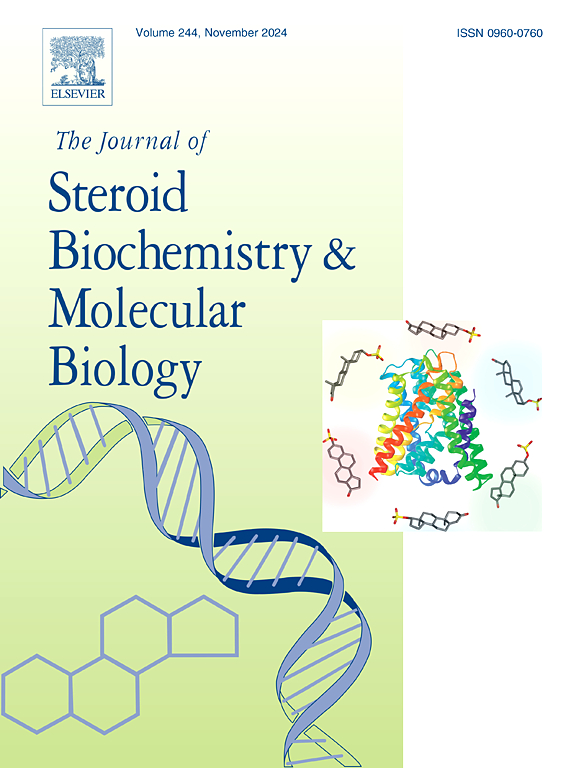二氢辣椒素的雄激素受体抑制活性:来自体外、体内和计算机研究的见解
IF 2.5
2区 生物学
Q3 BIOCHEMISTRY & MOLECULAR BIOLOGY
Journal of Steroid Biochemistry and Molecular Biology
Pub Date : 2025-10-02
DOI:10.1016/j.jsbmb.2025.106872
引用次数: 0
摘要
作为一种天然辣椒素,二氢辣椒素通过减少脂肪组织中的脂肪积累而具有抗肥胖的特性。雄激素受体(AR)对人类的健康和疾病都至关重要,是前列腺癌治疗的主要焦点。本研究旨在探索二氢辣椒素如何抑制人前列腺癌细胞系的AR,旨在为前列腺相关疾病的临床治疗提供一种新的天然产物衍生的AR抑制剂。首先,我们观察到二氢辣椒素可以通过阻碍细胞周期在G0/G1期诱导人前列腺癌细胞的增殖抑制。此外,二氢辣椒素可能通过与AR- lbd结合,阻断AR从细胞质向细胞核的运动,从而抑制AR活性,这突出了其作为一种有效抑制剂的潜力。从机制角度看,二氢辣椒素促进AR从稳定伴侣复合物中释放,并通过E3连接酶增强其泛素化,导致AR通过泛素-蛋白酶体途径部分降解。我们对二氢辣椒素对AR抑制作用的分子机制的研究表明,二氢辣椒素在体内不仅能抑制前列腺癌细胞的生长,还能抑制肿瘤的生长。这些结果为AR抑制剂的深入开发提供了实验证据和理论基础,强调了二氢辣椒素在针对前列腺疾病的功能食品或营养补充剂中的应用潜力。本文章由计算机程序翻译,如有差异,请以英文原文为准。
Androgen receptor inhibitory activity of dihydrocapsaicin: Insights from in vitro, in vivo and in silico studies
As a natural capsaicinoid from Capsicum annuum L., dihydrocapsaicin is well known for its anti-obesity property by reducing fat accumulation in adipose tissue. The androgen receptor (AR) is essential for both health and disease in humans and is the main focus for prostate cancer treatment. This study seeks to explore how dihydrocapsaicin inhibits the AR in human prostate cancer cell lines, aiming to offer a new natural product-derived AR inhibitor for the clinical management of prostate-related conditions. At first, it was observed that dihydrocapsaicin can induce proliferation suppression in human prostate cancer cells by hindering the cell cycle at the G0/G1 phase. In addition, dihydrocapsaicin probably inhibited AR activity by blocking its movement from the cytoplasm to the nucleus through binding to the AR-LBD, highlighting its potential as an effective inhibitor. From a mechanistic perspective, dihydrocapsaicin facilitated AR release from a stabilizing chaperone complex and enhanced its ubiquitination by E3 ligases, resulting in AR partial degradation via the ubiquitin-proteasome pathway. Our study on the molecular mechanisms behind dihydrocapsaicin's inhibitory effects on the AR revealed that it not only hindered the growth of prostate cancer cells but also reduced tumor growth in vivo. These results offer both experimental evidence and a theoretical basis for the thorough development of AR inhibitors, emphasizing dihydrocapsaicin's potential for application in functional foods or nutritional supplements targeting prostatic disorders.
求助全文
通过发布文献求助,成功后即可免费获取论文全文。
去求助
来源期刊
CiteScore
8.60
自引率
2.40%
发文量
113
审稿时长
46 days
期刊介绍:
The Journal of Steroid Biochemistry and Molecular Biology is devoted to new experimental and theoretical developments in areas related to steroids including vitamin D, lipids and their metabolomics. The Journal publishes a variety of contributions, including original articles, general and focused reviews, and rapid communications (brief articles of particular interest and clear novelty). Selected cutting-edge topics will be addressed in Special Issues managed by Guest Editors. Special Issues will contain both commissioned reviews and original research papers to provide comprehensive coverage of specific topics, and all submissions will undergo rigorous peer-review prior to publication.

 求助内容:
求助内容: 应助结果提醒方式:
应助结果提醒方式:


